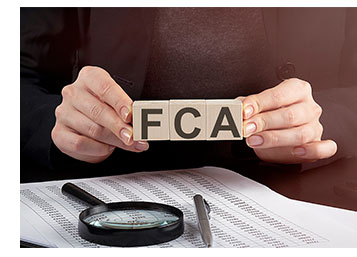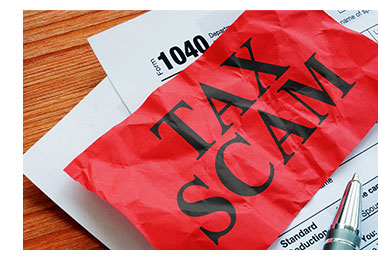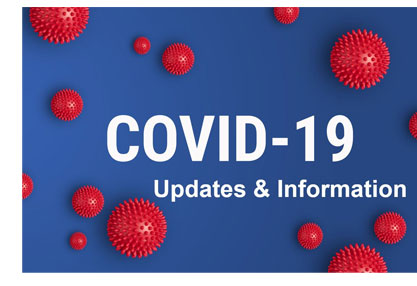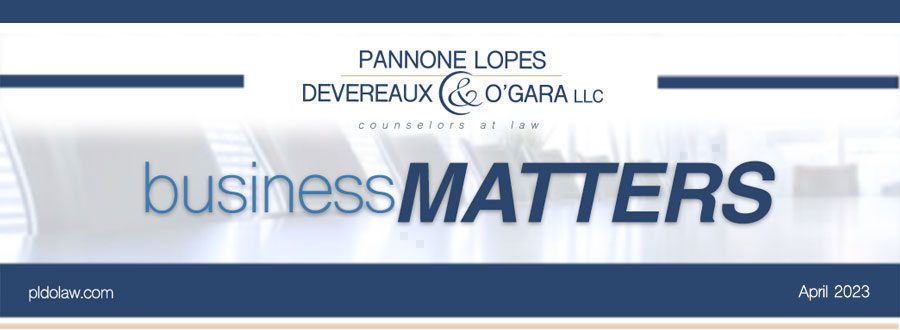THIS ISSUE'S HEADLINES
Is Reasonableness Coming to False Claims Act Enforcement?
‘Tis the Season for Tax Fraud
Should Your Construction Company Establish an ESOP?
Stay Informed — PLDO COVID-19 Resource Library

IS REASONABLENESS COMING TO FALSE CLAIMS ACT ENFORCEMENT?
 If you are a business owner or executive that provides the government with goods or services, you face a nightmare scenario when submitting invoices. Even if you closely follow every regulation with your billing, the government could interpret a law or regulation differently than you do and accuse your company of having filed a false claim. If you are a business owner or executive that provides the government with goods or services, you face a nightmare scenario when submitting invoices. Even if you closely follow every regulation with your billing, the government could interpret a law or regulation differently than you do and accuse your company of having filed a false claim.
The False Claims Act ("FCA") has evolved into one of the most powerful weapons used by federal and state governments to combat fraud and impacts a range of industries and sectors, especially healthcare, IT and construction. Liability under the FCA is significant, with the prospect of staggering monetary penalties and treble damages imposed for filing a false claim for payment.
Should a business be subject to the FCA when it acted in accordance with an objectively reasonable interpretation of regulations? This question is presently before the United States Supreme Court, as it reviews two cases known as Schutte v. SuperValu, Inc. and Proctor v. Safeway, Inc. To learn more about these developments, read our Advisory, Is Reasonableness Coming to False Claims Act Enforcement.
PLDO will keep our clients updated on the progress of this very important case. In the meantime, if you have questions, please do not hesitate to contact Partner Joel K. Goloskie at 617-771-1154 or jgoloskie@pldolaw.com, or Partner Aaron L. Weisman at 401-824-5169 or aweisman@pldolaw.com.
[back to top]

'TIS THE SEASON FOR TAX FRAUD
 The IRS recently issued a newswire (IR 2023-64) of the “Dirty Dozen” list of tax scams. While these scams and schemes exist throughout the year, there is a definite uptick in filing season. IRS Commissioner Werfel stated, “The IRS remains concerned about abusive tax arrangements, and they remain a focal point for our enforcement efforts. Taxpayers should beware of potentially abusive arrangements and promoters pushing them. People should seek out trusted, reputable tax advice and not be fooled by aggressive advertising and sales pitches.” Such transactions are a clear application of the maxim: “if it seems too good to be true, it probably is.” The taxpayer should remember that the buck stops with them, not with the promoter of the transaction or the practitioner who proposed the transaction. The IRS recently issued a newswire (IR 2023-64) of the “Dirty Dozen” list of tax scams. While these scams and schemes exist throughout the year, there is a definite uptick in filing season. IRS Commissioner Werfel stated, “The IRS remains concerned about abusive tax arrangements, and they remain a focal point for our enforcement efforts. Taxpayers should beware of potentially abusive arrangements and promoters pushing them. People should seek out trusted, reputable tax advice and not be fooled by aggressive advertising and sales pitches.” Such transactions are a clear application of the maxim: “if it seems too good to be true, it probably is.” The taxpayer should remember that the buck stops with them, not with the promoter of the transaction or the practitioner who proposed the transaction.
High-income filers should be vigilant regarding two of these schemes: charitable remainder annuity trusts and monetized installment sales. While these vehicles can be completely legitimate and accomplish tax efficiency, they are also ripe for abuse.
In a typical charitable remainder annuity trust (“CRAT”), a taxpayer transfers assets to the trust and draws an annual annuity. Abuse is found in the following scenario:
- Property with a fair market value in excess of its basis is contributed to the CRAT.
- The taxpayer claims the transfer to the CRAT resulted in an increase in the basis of the property to the fair market value.
- The trustee of the CRAT then sells the property but fails to recognize the gain based on the adjustment to fair market value.
- The CRAT purchases a single premium immediate annuity with the sales proceeds. The taxpayer is then advised that the remaining payment is “return of investment” so no tax is due.
The monetized installment sale transaction is essentially the sale of appreciated property where an intermediary purchases the appreciated property in exchange for an installment note. The installment note calls for payments of interest only with the principal due at the end of the term. The IRS finds abuse in this type of transaction since the seller receives the bulk of the proceeds, but recognition of gain is delayed until the final payment.
What’s the risk of engaging in these transactions? Accuracy related penalties range from 20-40% of the underpayment of tax, and civil fraud penalties can be 75% of the underpayment.
As always, be mindful of fake communications from bad actors posing as IRS agents or state revenue agencies. Specifically, the IRS has issued warnings about third party scammers offering IRS Online Account help, fake fuel tax credit claims, fake charities, unscrupulous tax return preparers, taking social media advise on form filing or other tax advice, and offer in compromise mills.
If you have questions pertaining to the CRATs, monetized installment sales or any other tax, estate and trust planning matters, please contact Attorney Leah A. Foertsch, Managing Partner of our Boca Raton, FL office, at 561-362-2030 or email lfoertsch@pldolaw.com.
[back to top]

SHOULD YOUR CONSTRUCTION COMPANY ESTABLISH AN ESOP?
 An Employee Stock Ownership Plan (“ESOP”) is a popular tool for business owners to provide key employees the opportunity to own shares in the company, which in turn can increase productivity and profitability, deliver numerous tax advantages and ensure there is a business continuity plan. Given the nuances involved in the construction industry and involvement of surety companies, ESOPs can be more challenging to effectuate. An Employee Stock Ownership Plan (“ESOP”) is a popular tool for business owners to provide key employees the opportunity to own shares in the company, which in turn can increase productivity and profitability, deliver numerous tax advantages and ensure there is a business continuity plan. Given the nuances involved in the construction industry and involvement of surety companies, ESOPs can be more challenging to effectuate.
In an Advisory, entitled “Should Your Construction Company Establish an ESOP?”, PLDO Managing Principal Gary R. Pannone discusses the advantages and disadvantages of ESOPs for construction companies, particularly as it relates to sureties and their requirements.
If you have questions pertaining to ESOPs, please contact Attorney Pannone at 401-824-5100 or email gpannone@pldolaw.com.
[back to top]

 STAY INFORMED – PLDO COVID-19 RESOURCE LIBRARY STAY INFORMED – PLDO COVID-19 RESOURCE LIBRARY
PLDO’s team of attorneys continue to add updates and advisories regarding the pandemic and its impact on families, businesses and organizations. To access our COVID-19 Resource Library, click here.
[back to top]
|




 If you are a business owner or executive that provides the government with goods or services, you face a nightmare scenario when submitting invoices. Even if you closely follow every regulation with your billing, the government could interpret a law or regulation differently than you do and accuse your company of having filed a false claim.
If you are a business owner or executive that provides the government with goods or services, you face a nightmare scenario when submitting invoices. Even if you closely follow every regulation with your billing, the government could interpret a law or regulation differently than you do and accuse your company of having filed a false claim. The IRS recently issued a newswire (IR 2023-64) of the “Dirty Dozen” list of tax scams. While these scams and schemes exist throughout the year, there is a definite uptick in filing season. IRS Commissioner Werfel stated, “The IRS remains concerned about abusive tax arrangements, and they remain a focal point for our enforcement efforts. Taxpayers should beware of potentially abusive arrangements and promoters pushing them. People should seek out trusted, reputable tax advice and not be fooled by aggressive advertising and sales pitches.” Such transactions are a clear application of the maxim: “if it seems too good to be true, it probably is.” The taxpayer should remember that the buck stops with them, not with the promoter of the transaction or the practitioner who proposed the transaction.
The IRS recently issued a newswire (IR 2023-64) of the “Dirty Dozen” list of tax scams. While these scams and schemes exist throughout the year, there is a definite uptick in filing season. IRS Commissioner Werfel stated, “The IRS remains concerned about abusive tax arrangements, and they remain a focal point for our enforcement efforts. Taxpayers should beware of potentially abusive arrangements and promoters pushing them. People should seek out trusted, reputable tax advice and not be fooled by aggressive advertising and sales pitches.” Such transactions are a clear application of the maxim: “if it seems too good to be true, it probably is.” The taxpayer should remember that the buck stops with them, not with the promoter of the transaction or the practitioner who proposed the transaction. An Employee Stock Ownership Plan (“ESOP”) is a popular tool for business owners to provide key employees the opportunity to own shares in the company, which in turn can increase productivity and profitability, deliver numerous tax advantages and ensure there is a business continuity plan. Given the nuances involved in the construction industry and involvement of surety companies, ESOPs can be more challenging to effectuate.
An Employee Stock Ownership Plan (“ESOP”) is a popular tool for business owners to provide key employees the opportunity to own shares in the company, which in turn can increase productivity and profitability, deliver numerous tax advantages and ensure there is a business continuity plan. Given the nuances involved in the construction industry and involvement of surety companies, ESOPs can be more challenging to effectuate. 